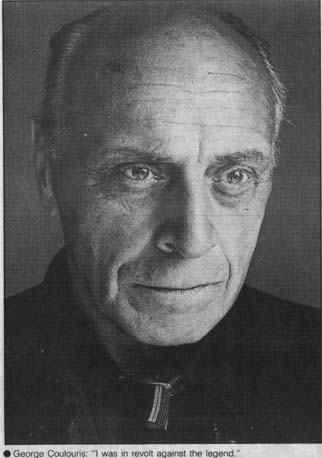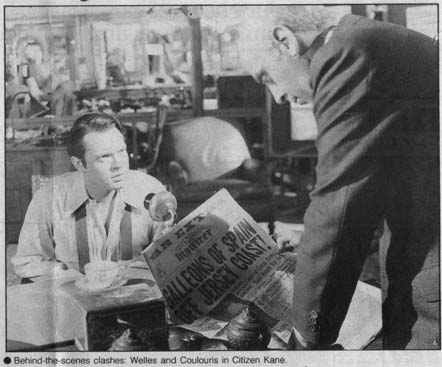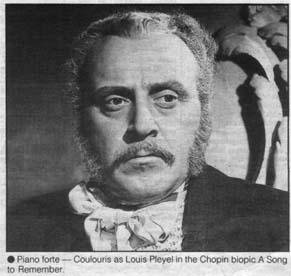
HAM AND HIGH MAY 5,1989
Taking Hollywood by snowstorm

George Coulouris: "I was in revolt against the legend."

Behind-the-scenes clashes: Welles and Coulouris in Citizen Kane.
GEORGE COULOURIS, a formidable screen villain and stage actor, died with a wealth of memories collected over the 85 years of his life and waiting to be written.
His cottage in the Vale of Health, Hampstead, his home for the past 40 years, is strewn with pages of the story of his colourful life, which he was dictating to his wife Elizabeth will two months ago.
The Manchester-born son of a Greek businessman who, in his own words, left home one night 69 years ago, "off to London to show the world the next great Othello", enjoyed a prolific career, darting between Hollywood and London and switching from stage to screen with professional ease.
His most famous role was in the Orson Welles classic Citizen Kane, in which he played the cold Bounce lawyer Walter Parks Thatcher who whisks the young Kane off his sledge and into the world of newspapers.
The Iconoclastic Coulouris didn't take kindly to the boy wonder Wages when they first met ("I was In revolt against the legend; it is a role that comes easily to me") but that rebellious attitude was sufficient for Welles to ask him to take the role of Anthony in his notorious modern-dress Broadway production of Julius Caesar.
"I found myself on a chilly October morning in a coined bootleg brewery on the banks of the Hudson grappling with 'Friends, Romans, Countrymen, surrounded by chunks of falling ceiling," Coulouris wrote.
He was firmly established in Welles' Mercury Theatre Company and was put on the RKO payroll with a guaranteed five-weeks' salary for Welles's first film project.
Coulouris soon found himself amen. playable - for Welles refused to let his actors work anywhere else - then on. employed when the project was aborted and RKO took him off the payroll.
But out of the ruins came Citizen Kane, a film which Coulouris described to a friend in a letter at the time as the wont project he had been involved in.
"The first scene I played was with Agnes Moorhead," he recalled. "I had to take over the boy Kane in the middle of a Colorado blizzard. For mow Orson tried everything, including, of all things, snow. We tried all the breakfast foods. Nothing worked but coca flakes So we spent three days up to the neck in them."
In mother letter he wrote: "I get 1,000 dollars a week. Well" has finally rationalised himself into playing the lead as well as directing. I have now been on salary for 17 days and have worked one and a half.
"The movie is going to be terrible, as Welles is a ham and is in practically every scene. I have been unable to restrain my opinion of him, so have
passed it on to all the stupid, idiotic sheep-like make-up men, cameramen, etc., who regard him as a genius. Oh, this is an irritating place. Why the bell they can't stick to their business of entertaining morons and not gabble about art is beyond me."
Coulouris resented his Greek back. ground, embracing the English culture of Manchester Grammar School, and years later bemoaned his inability to win ordinary parts because of his fore. foreign-sounding surname.
Nor did his Mancunian accent help. Though he was passionate about Lancashire cricket and described his return to Urmston after a disastrous Greek venture with his father as "paradise regained". his Northern dialect was a hindrance to his theatrical pursuits.
Having left home for London, he resorted to bellowing Shakespeare at theatre managers but with no success. "I wrote me more letter that meant something to Sybil Thorndike," he recalled in his memoirs. "She received me during a matinee of St Joan, in full armour. I began my usual bellowing, searing her mother a bit, sitting In the corn" or the dressing room.
"Min Thorndike was as usual generous and kind and advised me to apply for a scholarship at the Central School of Speech Training and Dramatic Art, where, she told me, was to be found the best person for correcting local speech defect,."
Coulouris got then eventually, via teaching jobs in Switzerland and Italy, and a return home to Lancashire.
He studied at the Central School, then at the Albert Hall, under the tutorship of Elsie Fogerty, in the company of fellow students Laurence Olivier and Peggy Ashcroft.
His career took off with his London debut in Henry V at the Old Vic in 1926. In the same year, his mother, the driving force behind his departure for London, fell M. He always remembered how news of her illness came to him late because of the General Strike, which also prevented him returning to Manchester before she died.
Coulouris sailed for New York in 1929 to resume a career on Broadway and in Hollywood. In 20 years he made 25 films, including For Whom the Bell Togs, Mr Skeffington and most notably Watch On The Rhine, in which he played Teck de Brancovis, the Romanian count who blackmails an and-Nazi resistance leader. The role won him an Oscar nomination.
In 1949, he returned with his wife Louise and their son and daughter to England. With his Hollywood earnings he bought the Vale of Health cottage for £7,000.
Coulouris took up rules in the Doctor in the House films and In Papillon, Mahler and Murder on the Orient Express.
But he relished stage work in his later Years, seizing the opportunity to Play I- in Glasgow in 1962, a role he repeated 20 years later at the St George's Theatre in Tufnell Park.
George Coulouris was an individualist, according to his family and close friends, less happy with a group of people and dedicated to his work.
Actor Leonard Fenton remembered him as a man of integriiy with a strong personality. "It was his attitude to his work that impressed me; a great deal of himself come through.
A memorial meeting was held at Burgh House, Hampstead, on Monday.

Coulouris as Louis Pleyel in the Chopin biopic A Song to Remember.